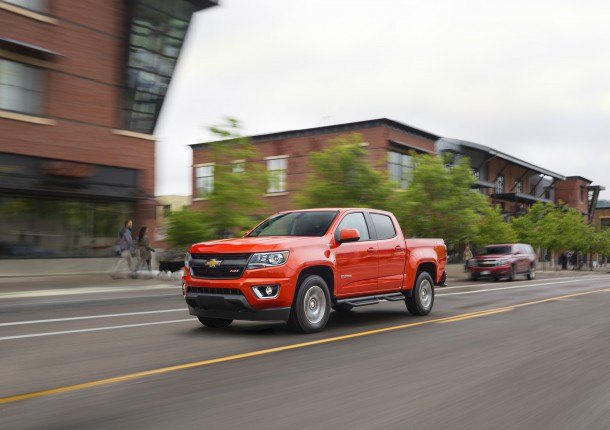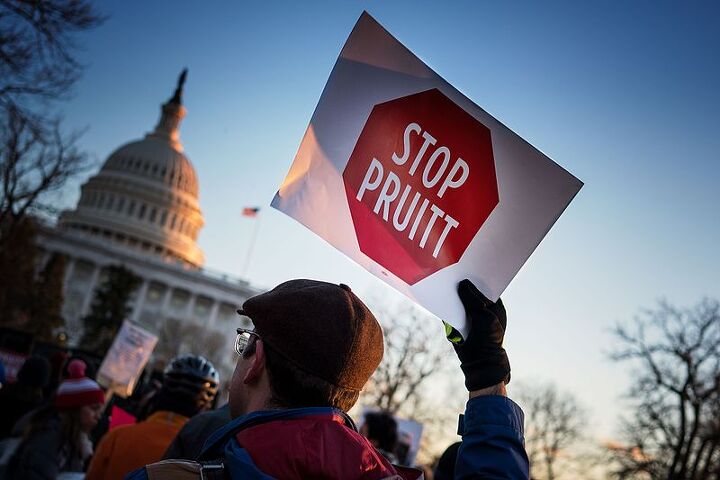#FuelEconomy
California Prepares Counteroffensive in Great American Gas War, Asks Automakers For Ammo
California is considering a formal, public counter-proposal to the Trump administration’s proposed rollback of the existing fuel economy requirements for passenger vehicles. Gearing up for the launch, the state has requested that automakers present detailed information on their future products and explain why they’re seeking relief from fueling mandates they previously agreed to adhere to.
“They’ve never submitted to us any information that would back up those claims in any detail to help us craft a solution,” Mary Nichols, chair of the California Air Resources Board, (CARB), said in a Thursday interview with Bloomberg.
California Vows to Work Toward National Emissions Standard (While Voting to Keep Its Own)
California regulators voted on Friday to mandate an adherence to Obama-era federal vehicle emissions standards for cars sold in the state, regardless of Trump administration efforts to weaken the standards. It’s the latest salvo in a war between the Golden State and the current administration, which aims to strip California of its ability to self regulate its automotive emission rules and roll back the corporate average fuel economy for the entire country.
However, the Trump team doesn’t appear to be completely ignoring the environment. In a 500-page environmental impact statement from the NHTSA on the Safer Affordable Fuel-Efficient (SAFE) Vehicles Rule for Model Year 2021–2026, numerous inclusions acknowledge the existence of climate change. But the takeaway from the report is that the NHTSA doesn’t seem to feel that passenger vehicles will make much of a difference.
EPA Finally Rates the Full 2019 Ram 1500 Lineup
For the majority of this year, Ram fans have been limited to a single choice of powertrain in the new 2019 Ram 1500 pickup truck. The stalwart and sonorous 5.7-liter Hemi V8 was the sole available selection for ages, with the eTorque-assisted V6 and V8 motors scarce on the ground until recently.
The feds have at last doffed their cloak from over the eTorque V6 and officially stamped an EPA mileage rating on it. Buyers satisfied with a two-wheel-drive truck powered by six cylinders will find themselves in command of a pickup rated at 25 mpg.
White House and California Still Discussing Emission Rules, Incredibly
Considering that the Trump administration’s Safer and Affordable Fuel Efficient (SAFE) Vehicles proposal specifically calls for the revocation of California’s power to set its own emissions rules, it’s miraculous that the Golden State is still willing to discuss the issue. But here we are.
Administration officials and members of the California Air Resources Board (CARB) emerged from a meeting on Wednesday, saying they were working toward resolving their differences over vehicle emissions, interested in establishing a single national standard, and — get this — would be happy to meet again.
Fueling the Opposition: EPA Staff Had Serious Reservations About CAFE Rollback Proposal
Staff at the Environmental Protection Agency had major disagreements over the decision to rollback corporate average fuel economy (CAFE) standards for the coming years, according to documents released last week. The matter echoes an event in May where science advisers for the EPA claimed the agency had ignored its own research in order to rationalize the push to relax fuel targets.
Both items have given ammunition to critics of the new proposal to claim the choice was politically motivated and based upon shoddy, biased research. Interesting, considering that’s exactly what the current administration said about the earlier decision to make them more stringent.
Led by the National Highway Traffic Safety Administration and backed by EPA, the current proposal seeks to keep fuel economy standards at 2020 levels — rather than continuing to elevate them. The arguments made for the move revolved around existing consumer preferences and saving lives. However, some of the agency’s staff seemed to be concerned with the NHTSA’s data and claimed it had overstepped by including the EPA in documents it didn’t approve of.
Mazda CX-5 Diesel: Is This Fuel Economy Enough to Get Buyers In Line?
The diesel version of Mazda’s wildly popular CX-5 crossover was originally supposed to land on these shores in late 2017, but the plan hit a snag. As such, we’re still waiting. But the model’s appearance now seems imminent.
Having cleared the Environmental Protection Agency’s stringent testing regimen, we now know exactly what fuel economy to expect from the CX-5 and its compression ignition 2.2-liter Skyactiv-D inline-four. The question is: is the CX-5 diesel thrifty enough?
2019 Chevrolet Camaro: More Speeds, Fewer MPGs
The EPA’s getting quite a few mentions on TTAC today, but it’s not because of the agency’s planned rollback of corporate average fuel economy standards. No, it’s because of odd fuel economy rollbacks seen among 2019 Chevrolet models.
We told you earlier about the yet-unexplained drop in city and combined fuel economy for the 2019 Chevrolet Colorado and GMC Canyon diesels. Now you can add the 2019 Chevrolet Camaro to the list of models with missing MPGs. It seems that in one area of performance, 10 speeds isn’t better.
2019 Chevrolet Colorado Diesel Takes a Mysterious Fuel Economy Hit
Until an automaker comes along with something better, your cheapest bet for highway fuel economy in a pickup is the Duramax diesel-powered Chevrolet Colorado and its GMC Canyon twin. The full-size Ford F-150 with 3.0-liter diesel V6 matches it in economy, but not price.
Boasting a 30 mpg EPA rating for highway consumption, the oil-burning midsizers command a premium over their lesser siblings, but make up for it with thriftiness and heaps of torque. The 2.8-liter inline-four generates 369 lb-ft of twist — far more grunt than the 275 lb-ft on offer from GM’s 3.6-liter V6.
However, there’s a mystery afoot. The EPA ratings for the newest Colorado and Canyon diesels show a drop in city and combined efficiency for the 2019 model year, despite the powertrains being a carry-over.
QOTD: How Much Do You Hate Stop-Start Technology?
One of my biggest pet peeves is the very existence of stop-start systems in modern vehicles. In theory, they’re intended to improve fuel economy by shutting down the engine while the car is stationary — when you’re effectively getting zero miles per gallon. In practice, they’re more of a nuisance than anything else. Every time I’m in a car that’s unfamiliar to me and the system shuts down the engine at a stop light, there is a fraction of a second where I assume something has gone terribly wrong and my stomach drops out of my body and onto the seat. Maybe I’ve just driven too many junkers but the sensation is always unsettling to a point where I have to deactivate the system to maintain peace of mind.
I am also fairly confident that repeatedly cycling your engine in stop-and-go traffic isn’t great for the crankshaft and a host of other components, even if the manufacturer is trying its utmost to mitigate the issue. But I’m aware that some people don’t mind their vehicle becoming a jittery, broken-feeling mess in an urban environment so long as it saves them some fuel in the long run. Unfortunately, that information hasn’t made me hate it any less.
What about you? Is stop-start technology the bane of your driving existence or a necessary evil in the war on emissions?
EPA and NHTSA Officially Release Fuel Economy Plan, California Decidedly Pissed
After months of discussion, circulating drafts, and arguing with the State of California, the Environmental Protection Agency and National Highway Traffic Safety Administration formally unveiled their plan to rewrite the existing corporate average fuel economy (CAFE) rules and replace them with something far less stringent.
The proposal would freeze the presiding standards in 2020 under the “Safer Affordable Fuel-Efficient (SAFE) Vehicles Rule for Model Years 2021-2026 Passenger Cars and Light Trucks” plan, which is a mouthful.
It also moves to revoke California’s authority to set its own mandates, as predicted. The Golden State made it clear that it wants to maintain the Obama-era limits. However, the proposal includes a section emphasizing the importance of a single national standard, saying it would seek to withdraw the waiver granted to California in 2013.
“Attempting to solve climate change, even in part, through the Section 209 waiver provision is fundamentally different from that section’s original purpose of addressing smog-related air quality problems,” reads the proposal. “When California was merely trying to solve its air quality issues, there was a relatively-straightforward technology solution to the problems, implementation of which did not affect how consumers lived and drove.”
States' Rights: EPA Seeks '50-State Solution' for Fuel Rules, California Happy to Settle for 16
Andrew Wheeler, the acting head of the Environmental Protection Agency, said the United States needs a single standard for fuel efficiency for cars and trucks on Tuesday. It’s a sentiment shared by Mary Nichols, head of California Air Resources Board, but it’s likely to put the two at odds. Wheeler said the pair shared that singular goal based off a meeting held last week, but California isn’t seeking the same benchmarks as the current administration.
The state objects to the EPA’s plan to weaken Obama-era efficiency targets, and is currently in the midst of a political and legal battle with the agency. However, Wheeler confirmed that, under his watch, the group would continue seeking a “50-state solution.”
Replacement EPA Boss on Board With California Gas Confab
Following Andrew Wheeler’s appointment as acting head of the Environmental Protection Agency, he extended an invitation to the California Air Resources Board to discuss emission regulations — a matter which former EPA administrator Scott Pruitt seemed less inclined to discuss with the state.
Mary Nichols, chairman of the board, said Wheeler reached out to state officials and the pair agreed to hold a meeting in Washington. It’s a slight easing of tensions in the cold war between D.C. and Sacramento.
Nissan Confesses to Falsified Testing Data for Japanese Vehicles
After Volkswagen’s diesel emissions scandal came under public scrutiny, numerous industry analysts prophesied it would not be an isolated incident. Cheating had been done in the past, and would likely continue into the future. In fact, numerous experts claimed every major automotive manufacturer probably engaged in illicit behavior to some degree. With so many laws and employees who may be interested in shirking them, it’s bound to happen time and time again.
On Monday, Nissan Motor Co. admitted it improperly measured exhaust emissions and fuel economy for 19 vehicle models sold in Japan. Late last year, Nissan and Subaru both confessed that they had allowed uncertified technicians to conduct finial vehicle inspections. Initially, the issue seemed like a harmless oversight, but in some cases the failing went unnoticed for decades, resulting in falsified data as a way to cut corners. Both Mitsubishi Motors and Suzuki admitted in 2016 that they exaggerated the fuel economy of their vehicles by cheating on tests.
Endless Pressure and Public Scandal Leads to Pruitt's Resignation as EPA Head
Environmental Protection Agency Administrator Scott Pruitt, who spearheaded the Trump administration’s initiative to roll back Obama-era fuel economy standards for light vehicles, has resigned. Even after assuming the position, Pruitt remained a tough sell as head of the EPA. His stance on climate change was uncharacteristic of any modern-day environmentalist and he seemed utterly bent on corporate deregulation to bolster profits and stimulate the economy.
Then came a flurry of scandals stemming from frivolous spending habits, improper use of authority, and possible business ties that would inhibit his ability to act in an unbiased manner. Numerous federal investigations were launched into these matters.
While a number of the impropriety claims came from political opponents actively hunting for gaps in his armor, let’s face it, Pruitt hasn’t been making things particularly difficult for them.
Two Fewer Cylinders Spells a Price Drop for Volume 2019 Chevrolet Silverado Trim
Full-size truck buyers looking for the latest thing are spoiled for choice this year. Besides an all-new Ram 1500 (currently unavailable with a V6) and the usual offerings from Ford, there’s a next-generation Chevrolet Silverado and GMC Sierra arriving this fall.
Unlike those other models, the GM twins went somewhere full-size truck builders fear to tread: the land of four-cylinders. Looking at GM’s newly released price list for the 2019 Silverado, it’s clear the new 2.7-liter turbocharged inline-four stands to save buyers money in more ways than one.





























Recent Comments